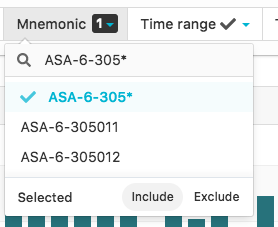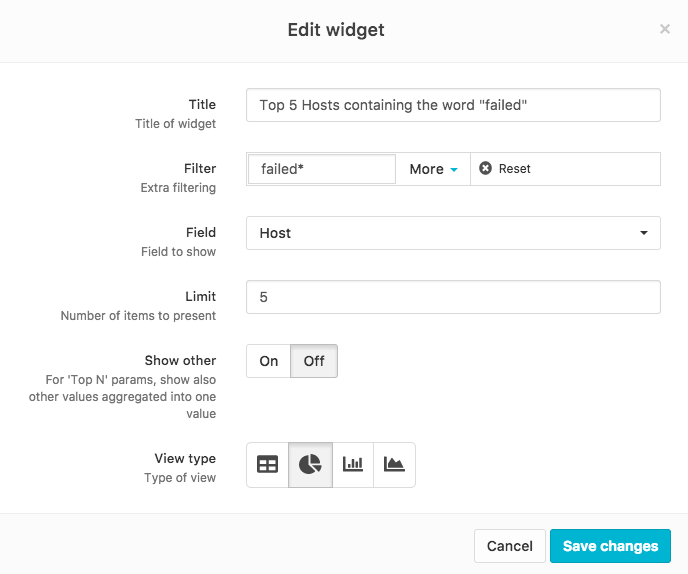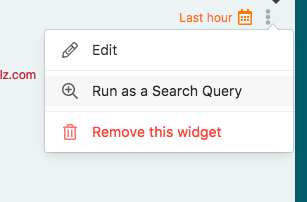The Search Results page will provide a list of events matching the criteria set by one of:
- The Main Query Bar
- Widget Data Search
- Direct URL Entry
Main Query Bar
The Query Bar provides an easy-to-use interface for setting filters on queries. For syntax on text matching, please refer to the Search Syntax help document.
Users may also set more filtering criteria using the query bar such as:
- Severity
- Host
- Facility
- Program
- Cisco Mnemonics
- Time Range
- Type (Actionable, Non-Actionable, Unknown)
- User Tag
Each dropdown provides a list of recently seen entries. Wildcards may be used to search for any unlisted entries in the dropdown.
In the example below, the search results would return all events matching ASA-6-305*.
Note that after typing ASA-6-305* (case-sensitive) you must select the wildcard pattern typed in as seen below in the screenshot (indicated by the blue check mark).
Widget Data Search
All widgets have an option to perform a search of the data contained in the widget itself. This allows the user to perform searches without having to manually enter all of the filter criteria set in that widget.
For example, the widget below has a filter set for showing only the Top 5 hosts which contain the word failed in the message.
To search for all events contained in that widget, simply select the widget handle, then click Run as Search Query
Direct URL Entry
LogZilla also allows direct searching via the browser's URL by typing the query string along with any desired filter criteria.
Usage
- The
searchcall must start with a question mark, i.e.:/search?msg=foo - It may contain keys with or without values separated by an
=(equal) sign or pairs separated by ampersand. - If multiple values for a single parameter are present in the URL (e.g.:
/search?facility=USER&facility=KERN), the requested search for these two items will return results foreitherof the two filters (booleanOR).
Example
http://logzilla.company.com/search?msg=successful%20auth&facility=USER&severity=Info&time_range=2017-12-13T00:00~14T00:00
URL Query String Parameters
msg
Type: string
Search terms are encoded as a Uniform Resource Identifier (URI) component (encodeURIComponent() function or equivalent) supporting mixed-mode search syntax searches.
facility
Type: string or array<string>
Facility keywords (case-insensitive) are defined in RFC 3164.
Supported values
| Keyword | Description |
|---|---|
KERN |
Kernel messages |
USER |
User-level messages |
MAIL |
Mail system |
DAEMON |
System daemons |
AUTH |
Security/authorization messages (note 1) |
SYSLOG |
Messages generated internally by syslogd |
LPR |
Line printer subsystem |
NEWS |
Network news subsystem |
UUCP |
UUCP subsystem |
CLOCK |
Clock daemon (note 2) |
AUTHPRIV |
Security/authorization messages (note 1) |
FTP |
FTP daemon |
NTP |
NTP subsystem |
AUDIT |
Log audit (note 1) |
ALERT |
Log alert (note 1) |
CRON |
Clock daemon (note 2) |
LOCAL0 |
Local use 0 (local0) |
LOCAL1 |
Local use 1 (local1) |
LOCAL2 |
Local use 2 (local2) |
LOCAL3 |
Local use 3 (local3) |
LOCAL4 |
Local use 4 (local4) |
LOCAL5 |
Local use 5 (local5) |
LOCAL6 |
Local use 6 (local6) |
LOCAL7 |
Local use 7 (local7) |
These values may also be found in the LogZilla API on your server at /api/dictionaries/facility
host
Type: string or array<string>
Hostname or IP address of the device.
mnemonic
Type: string or array<string>
Cisco mnemonic.
Warning: Mnemonics should be passed without the
%prefix as the%is a reserved character for URI encoding.e.g.:
SYS-5-CONFIG_Iinstead of%SYS-5-CONFIG_I
program
Type: string or array<string>
Name of the source program/process.
severity
Type: string or array<string>
Severity name (case-insensitive) as defined in RFC 5424.
Supported values
| Name | Description |
|---|---|
Emergency |
System is unusable |
Alert |
Action must be taken immediately |
Critical |
Critical conditions |
Error |
Error conditions |
Warning |
Warning conditions |
Notice |
Normal but significant condition |
Info |
Informational messages |
Debug |
Debug-level messages |
These values may also be found in the LogZilla API on your server at /api/dictionaries/severity
time_range
Type: string or start:iso8601~end:iso8601
Default: last_1_hours
Option 1: Time range preset
Use relative time range preset as defined in the API on your server at /api/dictionaries/time_range.
| Preset | Description |
|---|---|
last_1_minutes |
Last minute |
last_1_hours |
Last hour |
last_6_hours |
Last 6 hours |
today |
Today |
yesterday |
Yesterday |
last_3_days |
Last 3 days |
last_7_days |
Last week |
last_30_days |
Last 30 days |
Fetch list from API
Option 2: Date time range
Searches within a specific time range using combined ISO 8601 date/time representation of start and end times, should contain a tilde character (~) as the separator (basic format is YYYY-MM-DDTHH:mm:ss.sss~YYYY-MM-DDTHH:mm:ss.sssZ). If any elements are missing from the end value, they are assumed to be the same as the starting value.
Examples
-
2017-12-01T18:00~2018-01-03T01:00→ ⟨Dec 1, 2017 6:00 PM,Jan 3, 2018 1:00 AM⟩ >Dec 1, 2017, 6 PM — Jan 3, 2018, 1 AM -
2017-11-04~06→ ⟨Nov 4, 2017 12:00 AM,Nov 6, 2017 12:00 AM⟩ >Nov 4, 12 AM — Nov 6, 12 AM, 2017 -
2017-08-04T08:00:00~11:00→ ⟨Aug 4, 2017 8:00 AM,Aug 4, 2017 11:00 AM⟩ >Aug 4, 2017, 8—11 AM
sort
Type: string
Default: -last_occurrence
Name of the field to sort by (first_occurrence, last_occurrence or counter). Prefixing with a negative sign reverses the order.




